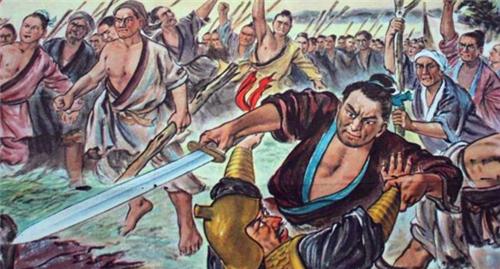Since the end of Qin, Wu Guang Chen Sheng shouted, "The prince will have a kind of XiangNing!" At the beginning of the slogan, in China's more than two thousand years of feudal society, the peasant uprising has become the biggest force to promote regime change As an ancient agricultural civilization, basically every dynasty can emerge a large peasant force in one breath, from the Red Brow Army of the Western Han Dynasty, the Yellow Turban Army of the Eastern Han Dynasty, to the Yellow Nest of the Tang Dynasty, and the Red Turban Army at the end of the Yuan Dynasty. The Great Shun Army at the end of the Ming Dynasty, and the Taiping Heavenly Kingdom of the Qing Dynasty.
For those central imperial courts, how to solve these peasant rebels is also a very difficult problem, if it is not solved well, the Jiangshan will be gone (Yuan Dynasty and Ming Dynasty), even if it is not easy to solve, they will have to peel off their skin if they do not die, and the Yuan Qi will be seriously injured (Han Dynasty and Tang Dynasty).

However, there are exceptions to everything, in The history of China, there is a dynasty that can be said to be the most difficult to rebel, from the founding of the country to the demise, no one has succeeded in the uprising, and this is the Song Dynasty, which has been founded for more than three hundred years.
Speaking of the characteristics of the Song Dynasty, most readers may have two impressions, the first is that they are weak to the outside world, they have fought against the regime in the north, and the war has basically not won, and the second is that there are many traitors, from Gao Li Cai Jing, to Qin Jun, to Jia Xiangdao, the traitors have not been broken.
According to the reasoning, in such a dynasty with internal and external troubles, the common people should rise up even more, but in fact, how? In 1120, Fang La, in Anhui, led the oppressed peasants to launch an uprising, and soon conquered dozens of prefectures and counties, but in 1121, only a year later, under the conquest of the official army, Fang La ended in a fiasco. As for Song Jiang, who was involved in Liangshan's affair, it was also not as outrageous as the "Water Margin", their power was smaller than Fang La's, and they gathered fishermen and peasants near Liangshan who were dissatisfied with the official army, and as a result, they were defeated by the local official Zhang Shuye within a few months.
Time came to the Southern Song Dynasty, and then there was a Yang Shu rebellion near Dongting Lake, which just happened to bump into the rebellious Yue Fei, and in 1133, yang Mi was elected as the leader for two months, and then the Yue family army attacked Dazhai, and the uprising failed.
In general, from Song Jiang Fangla to Yang Mi, no one posed a threat to the Song Dynasty, and their biggest enemy was still the north. Why is that?
Throughout history, the Song Dynasty is one of the richest dynasties in Chinese history, and some scholars have made statistics that the per capita GDP of the Song Dynasty was 450 US dollars, more than the 450 US dollars in Western Europe at that time, and its social prosperity was even higher than that of the Sheng Tang Dynasty.
In the past, the main reason for the peasant uprising was still not enough to fill the stomach, and the agriculture of the Song Dynasty was very developed, and the monarchs of the past paid great attention to the construction of water conservancy, while encouraging the people to open up in a large area, and the agricultural tools were also greatly improved, in 996, the national cultivated land area was 3.1 million hectares, and by 1021 it had grown to 5.2 million.
In addition, in terms of agricultural tools, there were ploughs instead of cattle farming, martingales for planting seedlings, and Song Zhenzong introduced drought-tolerant and early-maturing rice seeds from Champa (Vietnam) and distributed them to Jianghuai and Zhejiang, so that the population of the Song Dynasty rapidly grew from 37.1 million to 126 million in 1124.
In addition, the song dynasty's large-scale raising of soldiers brought a heavy burden to the country, and at the same time made the army weak in combat effectiveness, but it was precisely because of this that it supported a large number of unemployed vagrants and people without income, and on the other hand, it also ensured the stability of social order.
Unfortunately, the Song Dynasty was overthrown twice, but it was overthrown by the outside world, and if it were not for the Mongols who were too anti-heaven at that time, the Song Dynasty should have been able to last longer.